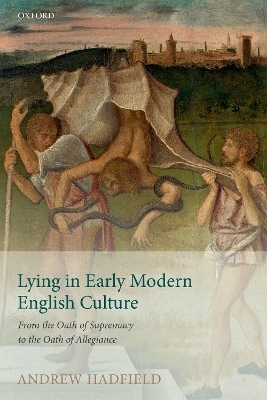
Lying in Early Modern English Culture
Oxford University Press (Verlag)
978-0-19-284480-4 (ISBN)
Lying in Early Modern English Culture is a major study of ideas of truth and falsehood in early modern England from the advent of the Reformation to the aftermath of the failed Gunpowder Plot. The period is characterised by panic and chaos when few had any idea how religious, cultural, and social life would develop after the traumatic division of Christendom. While many saw the need for a secular power to define the truth others declared that their allegiances belonged elsewhere. Accordingly there was a constant battle between competing authorities for the right to declare what was the truth and so label opponents as liars. Issues of truth and lying were, therefore, a constant feature of everyday life and determined ideas of individual identity, politics, speech, sex, marriage, and social behaviour, as well as philosophy and religion.
This book is a cultural history of truth and lying from the 1530s to the 1610s, showing how lying needs to be understood in action as well as in theory. Unlike most histories of lying, it concentrates on a series of particular events reading them in terms of academic theories and more popular notions of lying. The book covers a wide range of material such as the trials of Ann Boleyn and Thomas More, the divorce of Frances Howard, and the murder of Anthony James by Annis and George Dell; works of literature such as Othello, The Faerie Queene, A Mirror for Magistrates, and The Unfortunate Traveller; works of popular culture such as the herring pamphlet of 1597; and major writings by Castiglione, Montaigne, Erasmus, Luther, and Tyndale.
Andrew Hadfield is Professor of English at the University of Sussex and Visiting Professor at the University of Granada. He is the author of a number of studies of early modern literature and culture including Edmund Spenser: A Life (2012), which was awarded the Elizabeth Dietz Memorial Award; Shakespeare and Republicanism (2005), which was awarded the Roland H. Bainton Prize for Literature; John Donne: In the Shadow of Religion (2021); and Literature and Class from the Peasants' Revolt to the French Revolution (2021). He is currently editing the Complete Works of Thomas Nashe for OUP with Joseph Black, Jennifer Richards and Cathy Shrank.
Introduction: Being Economical with the Truth in Early Modern England
Part One: Lying and the Culture of Oaths
1: The Oath of Supremacy
2: The Oath of Allegiance
Part Two: Modes of Lying in Early Modern England
3: The Religious Culture of Lying
4: Rhetoric, Commonplacing, Poetics
5: Courtesy, Lying, and Politics
6: Testimony
7: Othello and the Culture of Lies between Conscience and Reputation
| Erscheinungsdatum | 03.11.2021 |
|---|---|
| Zusatzinfo | 5 black and white halftones |
| Verlagsort | Oxford |
| Sprache | englisch |
| Maße | 156 x 235 mm |
| Gewicht | 592 g |
| Themenwelt | Geschichte ► Allgemeine Geschichte ► Neuzeit (bis 1918) |
| Geisteswissenschaften ► Sprach- / Literaturwissenschaft ► Anglistik / Amerikanistik | |
| Geisteswissenschaften ► Sprach- / Literaturwissenschaft ► Literaturgeschichte | |
| Geisteswissenschaften ► Sprach- / Literaturwissenschaft ► Literaturwissenschaft | |
| ISBN-10 | 0-19-284480-6 / 0192844806 |
| ISBN-13 | 978-0-19-284480-4 / 9780192844804 |
| Zustand | Neuware |
| Haben Sie eine Frage zum Produkt? |
aus dem Bereich


